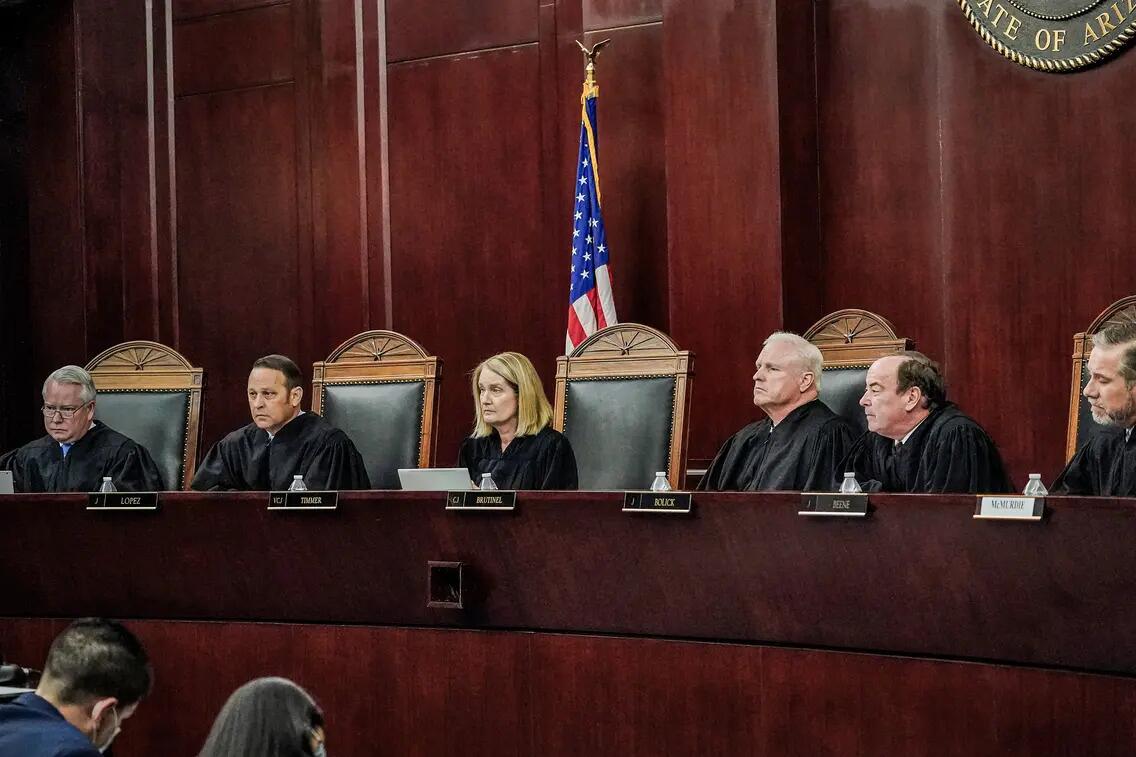Authored by Lawrence Wilson and Jacob Burg via The Epoch Times (emphasis ours),
The Florida Supreme Court issued a long-awaited ruling on April 1, upholding a 15-week abortion ban that was signed into law in 2022. The ruling paved the way for a six-week abortion ban to take effect on May 1.
A second ruling on the same day allowed an initiative to amend the state constitution to guarantee abortion access to be placed before voters. An abortion advocacy group had already secured the required signatures, so a constitutional question on abortion will be on the Florida ballot in November.
Barely a week later, the Arizona Supreme Court upheld an 1864 law banning nearly all abortions in the state. Three days later, the Biden campaign initiated a seven-figure ad buy in the Grand Canyon State, including a billboard that reads, “Abortion is banned in Arizona thanks to Donald Trump. He won’t stop until it’s banned nationwide. #TrumpsAbortionBan.”
Democrats are leveraging abortion as a central issue in the 2024 election, and they are waging that campaign through ballot initiatives in key battleground states.
The theory is simple, according to political analyst Keith Nahigian. “Ballot questions help to get more independent expenditures for ‘get out the vote’ campaigns,” he told The Epoch Times.
In Arizona, a campaign is underway for a ballot measure amending the state constitution to provide the “fundamental right” to abortion up to the point a baby could survive outside the womb, typically around 24 weeks. It also would allow later abortions to save the mother’s life or to protect her physical or mental health.
In Nevada, a petition drive is in the works to include an amendment on abortion access. In Colorado and Maryland, voters will decide on abortion-related amendments in November.
“The Democrats’ strategy heading into this election cycle was to put these measures on the ballot in every big swing state,” Phoenix-based Republican strategist Marcus Dell’Artino told The Epoch Times.
Republicans are using the same tactic with election integrity—placing related measures on the ballot in nine states, including in Arizona, Florida, and Wisconsin.
Both sides appear to believe their efforts will aid them in the fall and ballot measures themselves are a successful way to further a cause.
In the 2022 election, voters in 38 states decided on 140 statewide ballot measures, according to Ballotpedia. Voters approved 69 percent of the measures and rejected 31 percent.
The movement to amend state constitutions to guarantee abortion access is a calculated strategy by the Democratic Party to rally voters to the November election.
The Democratic Congressional Campaign Committee laid out the strategy in an April 5 memo.
The committee attributed a ballot measure to add abortion to the state constitution in Ohio for the “historic” turnout during an off-year election in November 2023. Voters in the state passed the measure 57 percent to 43 percent—a margin of 14 percent. President Trump won Ohio by 8 percentage points in both 2016 and 2020.

“When abortion is on the ballot, voters turn out to defend their rights,” the memo states. “Seven battleground states are on track to have abortion measures on the ballot in 2024 … this further guarantees that reproductive freedom will remain a driving issue for voters this November.”
Capitalizing on Momentum
Momentum around the issue of access to abortion has been building since the U.S. Supreme Court’s 2022 Dobbs decision overturned Roe v. Wade, the seminal decision that, for decades, limited restrictions states can impose on the procedure.
Within 18 months of the Dobbs decision, seven states put abortion-related ballot questions before the public. In red and blue states alike, voters came down on the side of access to abortion.
Voters in Kansas voted to stick with the status quo, which provides the right to abortion in the state constitution, while Kentucky voted to reject an amendment that said there was no constitutional right to an abortion.
Montana voters rejected a measure that would have declared a child born alive at any stage of pregnancy to be a legal person and required medical care for that child. The measure also included criminal penalties for health care providers who violated the “born alive” portion of the law, by establishing a maximum of a $50,000 fine and/or 20 years in prison.
Meanwhile, voters in California, Michigan, Vermont, and Ohio amended their state constitutions to include a right to “reproductive freedom,” defined to include abortion and contraception.
Democrats have hammered the issue for over two years while Republicans have been slow to admit that many of their own voters don’t favor a near-complete abortion ban.
In Virginia, Democrats took advantage of Gov. Glenn Youngkin’s interest in a 15-week abortion ban to campaign on abortion access in 2023. They retook control of the state’s General Assembly, prompting prominent Democrats to make abortion a centerpiece of the 2024 campaign.
“The prospect of a national abortion ban is real,” Michigan Gov. Gretchen Whitmer said in December 2023.
Ms. Whitmer launched the Fight Like Hell PAC in June 2023 to raise campaign funds for Democratic candidates who are “unapologetic in their fight for working people and their basic freedoms.”
The Biden campaign released an emotionally charged ad on April 8 featuring a Texas woman who was denied an abortion after being told her baby would not survive birth. Over the woman’s tearful sobs, text appears on the screen:“Donald Trump did this.”
Read more here…